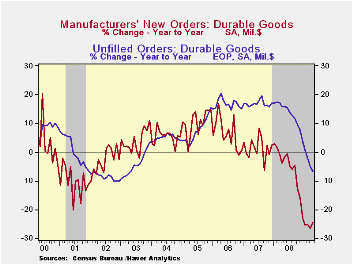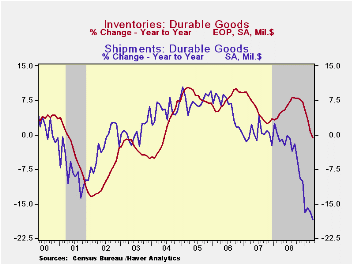 Global| May 28 2009
Global| May 28 2009U.S. Durable Goods Orders Recover Earlier Decline And Are Up Slightly 'YTD
by:Tom Moeller
|in:Economy in Brief
Summary
Perhaps the factory sector's distress is nearing its end. At least some moderation of last year's woes was evident in the latest report of durable goods orders. During April orders rose 1.9% following a 2.1% March decline which was [...]

Perhaps the factory sector's distress is nearing its end. At least some moderation of last year's woes was evident in the latest report of durable goods orders. During April orders rose 1.9% following a 2.1% March decline which was greater than reported initially. Consensus expectations were for a 0.5% April increase and during the last three months orders have risen at a 1.4% annual rate.That follows a 5.8% decline during all of last year.
A 5.4% rise (-27.5% y/y) in transportation equipment orders led last month's increase in total durables bookings after having been unchanged during March. Orders for motor vehicles & parts recovered 2.4% (-24.7% y/y) for the first monthly increase since last September. Machinery orders also rose but by a lesser 2.4% (-33.4% y/y) and electrical equipment orders ticked up 0.3% (-24.9% y/y). Orders for computers & electronic products, however, worked lower again and fell 2.7% (-10.9% y/y). Finally, primary metals bookings did increase 1.0% for the month but remained down by one-half from April of last year.
As is common during recession, the capital goods sector will lag any improvement in new orders for early cycle products. As such, orders for nondefense capital goods fell 2.0% last month and they have fallen in nearly each month since early last year. Orders excluding aircraft also fell by 1.5% during April and they are down by one-quarter over the last year. During the last ten years there has been an 80% correlation between the y/y change in nondefense capital goods orders and the change in equipment & software spending in the GDP accounts. The correlation of the GDP figure with capital goods shipments is, as one would expect, a larger 92%.
Shipments of durable goods continued lower and slipped 0.2% last month (-18.4% y/y). They have fallen at a 22.8% annual rate so far this year and the decline has been accompanied by a like three-month rate of decline in industrial production of durable goods. During the last ten years, there has been an 80% correlation between the change in shipments of durable goods and the change in durables industrial production.
Inventories of durable goods fell for the fourth consecutive month. The 0.8% decline was the fourth in a row and it brought the annual rate of change to -13.7%, the quickest since 2001. Decumulation of metals and machinery inventories has been notably fast. Backlogs in order books have fallen in each of the last seven months and during the last year by 6.7%, a rate of decline which is the sharpest since 2003.
The durable goods figures are available in Haver's USECON database.
Recession and Recovery Across the Nation: Lessons from History from the Federal Reserve Bank of Kansas City is available here.
| NAICS Classification (%) | April | March | Y/Y | 2008 | 2007 | 2006 |
|---|---|---|---|---|---|---|
| Durable Goods Orders | 1.9 | -2.1 | -24.4 | -5.8 | 1.4 | 6.2 |
| Excluding Transportation | 0.8 | -2.7 | -23.3 | -1.2 | -0.3 | 9.1 |
| Nondefense Capital Goods | -2.0 | -0.9 | -32.8 | -6.8 | 3.5 | 9.4 |
| Excluding Aircraft | -1.5 | -1.4 | -24.4 | -0.3 | -2.7 | 10.7 |
Tom Moeller
AuthorMore in Author Profile »Prior to joining Haver Analytics in 2000, Mr. Moeller worked as the Economist at Chancellor Capital Management from 1985 to 1999. There, he developed comprehensive economic forecasts and interpreted economic data for equity and fixed income portfolio managers. Also at Chancellor, Mr. Moeller worked as an equity analyst and was responsible for researching and rating companies in the economically sensitive automobile and housing industries for investment in Chancellor’s equity portfolio. Prior to joining Chancellor, Mr. Moeller was an Economist at Citibank from 1979 to 1984. He also analyzed pricing behavior in the metals industry for the Council on Wage and Price Stability in Washington, D.C. In 1999, Mr. Moeller received the award for most accurate forecast from the Forecasters' Club of New York. From 1990 to 1992 he was President of the New York Association for Business Economists. Mr. Moeller earned an M.B.A. in Finance from Fordham University, where he graduated in 1987. He holds a Bachelor of Arts in Economics from George Washington University.
More Economy in Brief
 Global| Feb 05 2026
Global| Feb 05 2026Charts of the Week: Balanced Policy, Resilient Data and AI Narratives
by:Andrew Cates






